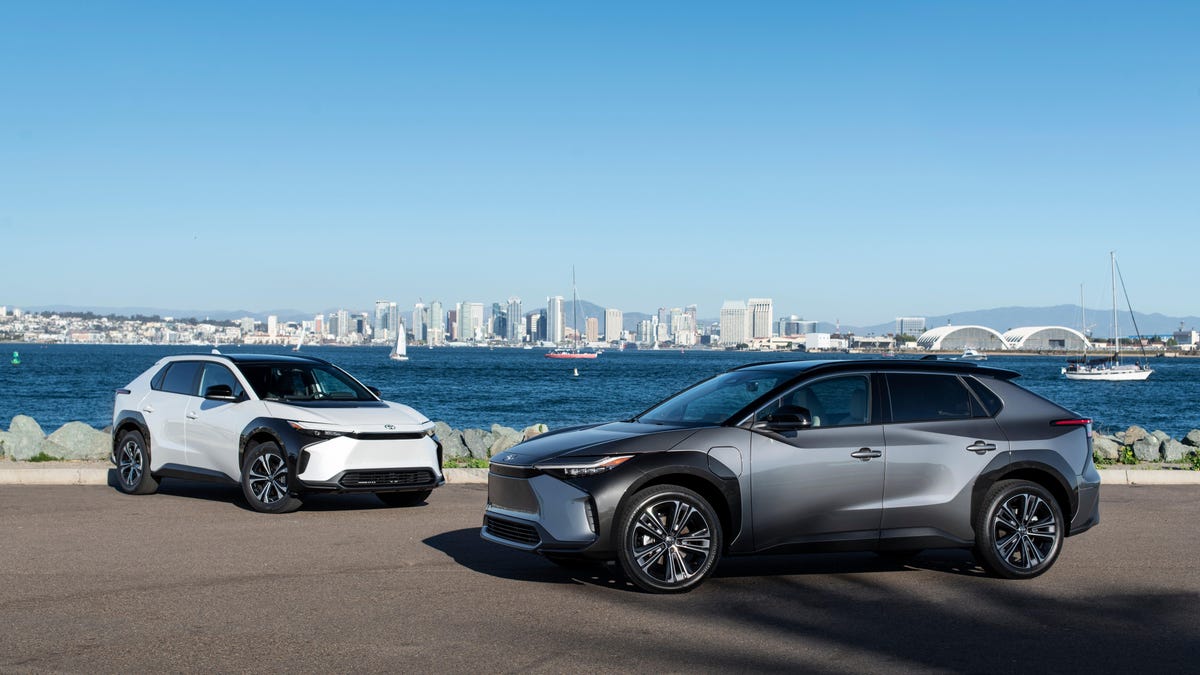Electric Vehicles Cost Too Much

Image: Toyota
While reading Elizabeth Blackstock’s post the other day that contemplated whether or not Toyota’s marketing plan for its first EV, the bZ4X would work — something dawned on me. I realized automakers don’t seem to want EVs in the hands of the masses — and it all has to do with cost, as every EV on sale costs way too much for the average American.
Elizabeth continued on in the article saying Toyota set its target demographic for the bZ4x at “slightly older folks, probably between 35 and 55, who make at least $100,000 a year and are probably looking to make the transition to their very first electric vehicle.” It’s Toyota’s first electric vehicle, and already they’re aiming for high income households.
I know, I know. Automakers are companies that are in the business of making money. The problem though is the push for electrification on Americans. That push is coming from both sides with consumers stuck in the middle: numerous automakers have committed to stop manufacturing gas-powered cars either before the end of the decade or sometime in 2030; various states have already called for or have legislation being put forth to ban the sale of gas-powered vehicles. Both have the backing of the federal government. The Biden Administration also wants mass consumer adoption of electric vehicles, pushing for an EV market share of 50 percent by 2030. All are ambitious goals and make for good PR and political clout. But the problem is that most EVs that are on sale or are coming soon are priced incredibly out of reach for people.
EV prices are truly the elephant in the room. In January of 2022, the average transaction price for an EV was $62,876. That’s over 93 percent of the median U.S. household income in 2020. EVs for the well-off are only pushing that average price higher. Think I’m lying? Go take a look for yourself. You have to drop over $60,000 to get into a Tesla Model Y. And that’s just for now as Tesla appears to be raising their prices every few months. A Porsche Taycan starts at almost $83,000 in its basic versions with its Audi e-tron GT cousin having a six-figure starting price of $102,400; Lucid has a cheaper Air coming, but it’s still going to cost you over $77,000 to get into one; Cadillac’s LYRIQ? It’s supposed to start at $60,000.
Even EVs from mainstream automakers are going to cost you over $40,000. The Ford Mustang Mach-E costs nearly $44,000 for the base Select trim with 247 miles of range; A Hyundai Ioniq5 starts at just over $43,000 — and good luck finding one for that as dealers stock them closer to $50,000 and up. Kia says its EV6 should start just under $41,000, but in the real world, you can barely find them under $50,000.
And don’t buy into or tell me “What about the EV tax credit?” This needs to be put on billboards around the country: The EV tax credit isn’t a discount on the vehicle’s price.
The feds and automakers have been selling it as such to make the prices on EVs easier to swallow. The “tax credit” doesn’t work like that. A dealer isn’t going to knock $7,500 off the price of whatever EV you’re trying to buy. Instead, you buy the EV and come tax time, you get a $7,500 credit on your taxes. That’s it. There are regional EV rebates, but that still isn’t a discount on the purchase price. Most of those have to be applied for, and you have to wait for a check to come in the mail if you use one. And if where you live is anything like California, you may be waiting months for that check.
You may also be saying “But automaker said the cheap stuff is coming!” Is it, though? Everything that’s known to be on the way is still years out. Chevy has its Blazer SS and Equinox EVs coming but not until late 2023. Chrysler has the badly needed Airflow, but that’s not until 2025. Fisker claims its Ocean will start at $37,499. But come on, it’s Fisker.
And it seems as though $40,000 is the new sweet spot for most cars, so even if cheap EVs are coming, I don’t see most coming in under that price. Mercedes burst bubbles recently when a company rep said that current EV tech cannot produce cheap EVs. And of the nearly 30 EVs currently on sale here in the U.S., just two start under $40,000: the Nissan Leaf ($27,400) and the Chevy Bolt/EUV ($31,500; $33,500 for the EUV).
Right now, EVs are a luxury, not a mass-market production vehicle. Time and again, studies have confirmed that many people just can’t afford to go green, and EVs are a big culprit.
So when will the cheaper EVs come? I wish I could give you an answer. But again, automakers can’t keep trying to sell the public on mass adoption of EVs while releasing vehicles that are priced out of reach for most Americans. With record vehicle prices and record profits for automakers, they don’t seem to be in any hurry to getting around to making the cheap stuff either.



